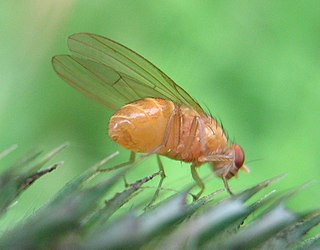Related Research Articles

The brain is an organ that serves as the center of the nervous system in all vertebrate and most invertebrate animals. It consists of nervous tissue and is typically located in the head (cephalization), usually near organs for special senses such as vision, hearing and olfaction. Being the most specialized organ, it is responsible for receiving information from the sensory nervous system, processing those information and the coordination of motor control.

Biology – The natural science that studies life. Areas of focus include structure, function, growth, origin, evolution, distribution, and taxonomy.

Neuroscience is the scientific study of the nervous system, its functions and disorders. It is a multidisciplinary science that combines physiology, anatomy, molecular biology, developmental biology, cytology, psychology, physics, computer science, chemistry, medicine, statistics, and mathematical modeling to understand the fundamental and emergent properties of neurons, glia and neural circuits. The understanding of the biological basis of learning, memory, behavior, perception, and consciousness has been described by Eric Kandel as the "epic challenge" of the biological sciences.

Neural Darwinism is a biological, and more specifically Darwinian and selectionist, approach to understanding global brain function, originally proposed by American biologist, researcher and Nobel-Prize recipient Gerald Maurice Edelman. Edelman's 1987 book Neural Darwinism introduced the public to the theory of neuronal group selection (TNGS) – which is the core theory underlying Edelman's explanation of global brain function.

Cognitive neuroscience is the scientific field that is concerned with the study of the biological processes and aspects that underlie cognition, with a specific focus on the neural connections in the brain which are involved in mental processes. It addresses the questions of how cognitive activities are affected or controlled by neural circuits in the brain. Cognitive neuroscience is a branch of both neuroscience and psychology, overlapping with disciplines such as behavioral neuroscience, cognitive psychology, physiological psychology and affective neuroscience. Cognitive neuroscience relies upon theories in cognitive science coupled with evidence from neurobiology, and computational modeling.

The hypothalamus is a small part of the brain that contains a number of nuclei with a variety of functions. One of the most important functions is to link the nervous system to the endocrine system via the pituitary gland. The hypothalamus is located below the thalamus and is part of the limbic system. It forms the ventral part of the diencephalon. All vertebrate brains contain a hypothalamus. In humans, it is the size of an almond.

The brain is the central organ of the human nervous system, and with the spinal cord makes up the central nervous system. The brain consists of the cerebrum, the brainstem and the cerebellum. It controls most of the activities of the body, processing, integrating, and coordinating the information it receives from the sense organs, and making decisions as to the instructions sent to the rest of the body. The brain is contained in, and protected by, the skull bones of the head.
Neurochemistry is the study of chemicals, including neurotransmitters and other molecules such as psychopharmaceuticals and neuropeptides, that control and influence the physiology of the nervous system. This particular field within neuroscience examines how neurochemicals influence the operation of neurons, synapses, and neural networks. Neurochemists analyze the biochemistry and molecular biology of organic compounds in the nervous system, and their roles in such neural processes including cortical plasticity, neurogenesis, and neural differentiation.

Behavioral neuroscience, also known as biological psychology, biopsychology, or psychobiology, is the application of the principles of biology to the study of physiological, genetic, and developmental mechanisms of behavior in humans and other animals.

Neuroethology is the evolutionary and comparative approach to the study of animal behavior and its underlying mechanistic control by the nervous system. It is an interdisciplinary science that combines both neuroscience and ethology. A central theme of neuroethology, which differentiates it from other branches of neuroscience, is its focus on behaviors that have been favored by natural selection rather than on behaviors that are specific to a particular disease state or laboratory experiment.

A neuroscientist is a scientist who has specialised knowledge in neuroscience, a branch of biology that deals with the physiology, biochemistry, psychology, anatomy and molecular biology of neurons, neural circuits, and glial cells and especially their behavioral, biological, and psychological aspect in health and disease.
Neuropharmacology is the study of how drugs affect function in the nervous system, and the neural mechanisms through which they influence behavior. There are two main branches of neuropharmacology: behavioral and molecular. Behavioral neuropharmacology focuses on the study of how drugs affect human behavior (neuropsychopharmacology), including the study of how drug dependence and addiction affect the human brain. Molecular neuropharmacology involves the study of neurons and their neurochemical interactions, with the overall goal of developing drugs that have beneficial effects on neurological function. Both of these fields are closely connected, since both are concerned with the interactions of neurotransmitters, neuropeptides, neurohormones, neuromodulators, enzymes, second messengers, co-transporters, ion channels, and receptor proteins in the central and peripheral nervous systems. Studying these interactions, researchers are developing drugs to treat many different neurological disorders, including pain, neurodegenerative diseases such as Parkinson's disease and Alzheimer's disease, psychological disorders, addiction, and many others.
The development of the nervous system in humans, or neural development, or neurodevelopment involves the studies of embryology, developmental biology, and neuroscience. These describe the cellular and molecular mechanisms by which the complex nervous system forms in humans, develops during prenatal development, and continues to develop postnatally.
The Journal of Neurophysiology is a monthly peer-reviewed scientific journal established in 1938. It is published by the American Physiological Society with Jan "Nino" Ramirez as its editor-in-chief. Ramirez is the Director for the Center for Integrative Brain Research at the University of Washington.
The NAS Award in the Neurosciences is awarded by the U.S. National Academy of Sciences "in recognition of extraordinary contributions to progress in the fields of neuroscience, including neurochemistry, neurophysiology, neuropharmacology, developmental neuroscience, neuroanatomy, and behavioral and clinical neuroscience." It was first awarded in 1988.
The following outline is provided as an overview of and topical guide to brain mapping:
The following outline is provided as an overview of and topical guide to the human brain:

The Princeton Neuroscience Institute (PNI) is a center for neuroscience research at Princeton University. Founded in the spring of 2004, the PNI serves as a "stimulus for teaching and research in neuroscience and related fields" and "places particular emphasis on the close connection between theory, modeling, and experimentation using the most advanced technologies." It often partners with Princeton University's departments of Psychology and Molecular Biology.
Jeffrey D. Macklis is an American neuroscientist. He is the Max and Anne Wien Professor of Life Sciences in the Department of Stem Cell and Regenerative Biology and Center for Brain Science at Harvard University, Professor of Neurology [Neuroscience] at Harvard Medical School, and on the Executive Committee and a Member of the Principal Faculty of the Neuroscience / Nervous System Diseases Program at the Harvard Stem Cell Institute.
References
- ↑ "Neuroscience". Merriam-Webster Medical Dictionary.
- 1 2 "Neuroscience | Psychology Today Canada". Psychology Today. Retrieved 2020-03-10.
- ↑ "the definition of neurobiology". Dictionary.com. Retrieved 2017-06-21.
- ↑ "Neuroscience Core Concepts". www.brainfacts.org. Retrieved 2022-04-27.